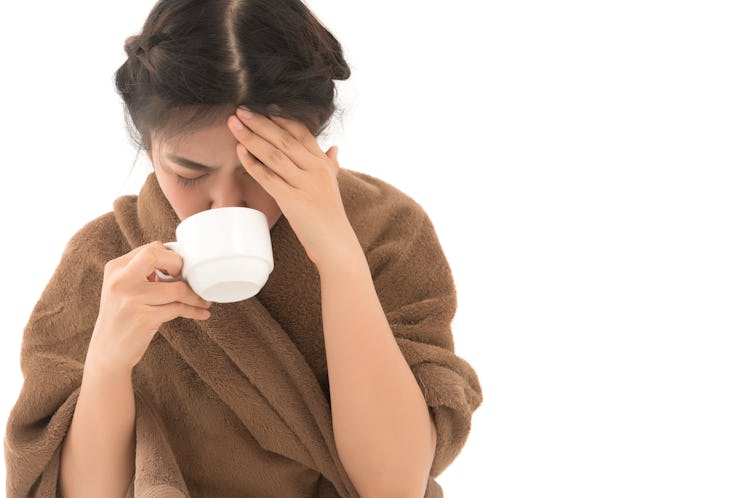
The Best Vitamins To Take For Your Headaches, According To An Expert
If you're one of the unlucky souls who frequently suffers from headaches or migraines, then you've probably tried a huge range of remedies to keep your pain at bay. From Excedrin to frozen eye masks, you've experimented with all of these so-called "tricks" at least once, but maybe you've never taken the time to think about which vitamins you should take for headaches, or perhaps you've never even considered whether vitamins play a role in headaches at all. In truth, vitamins can play a pivotal in establishing equilibrium for your body, and can also help to alleviate that head pain that won't seem to go away, no matter what you do.
In an exclusive interview with Elite Daily, Dr. Darria Long Gillespie, an ER doctor and TV health expert, explains the types of vitamins that can work to get rid of headaches. "Some evidence has shown that supplements such as magnesium, B-vitamins, butterbur, and feverfew can be beneficial for migraines," she says.
However, when it comes to using vitamins for any purpose, Dr. Gillespie says it's best to get these nutrients into your body via the food you eat, rather than taking them as supplements.
"There’s very little evidence that anything you take in pill form can match the health benefits of getting those vitamins and minerals in your nutrition," Dr. Gillespie tells Elite Daily.
This is especially the case if you're not frequently checking your vitamin levels, she adds, noting that research has shown that unnecessarily high amounts of certain vitamins and other antioxidants can actually increase your risk of disease in some cases.
Luckily, though, there are tons of ways to get these vitamins into your body organically and safely. According to Dr. Josh Axe, D.N.M., C.N.S., D.C., founder of DrAxe.com, best-selling author of Eat Dirt, and co-founder of Ancient Nutrition, a cup of either cooked spinach or Swiss chard can provide you with over 30 percent your daily suggested intake of magnesium. For B-vitamins (which include folate, as well as vitamins B6 and B12), you can get your fill from whole grains, beans, fortified grains, and most fruits and veggies.
When you're eating foods with these vitamins, Dr. Gillespie suggests you make sure to include fats in your meal as well, to help your body absorb the vitamins. "There are four vitamins, called the fat-soluble vitamins, that your body cannot absorb without eating them with fat," she tells Elite Daily. Though B-vitamins and magnesium aren't fat-soluble, they're found in foods that include a ton of other fat-soluble vitamins, like vitamins A, K, E, and D.
In other words, including healthy fats in your meals will ensure you're getting the very most out of what you're eating, including those vitamins you're searching for to relieve your headaches. "Have olive oil in your pasta sauce with crushed tomatoes, toss in avocado and olives with your leafy greens, and have a salmon with your salad, to make sure you’re absorbing all the benefits from your food," Dr. Gillespie recommends.
Butterbur and feverfew kind of sound like phrases from Harry Potter, but they're actually both different types of plant extract.
According to the National Center for Complementary and Integrative Health, butterbur is a type of shrub grown mostly in Europe, whose extract has been used medicinally for centuries. Similarly, feverfew is another European plant whose dried leaves have been used to combat migraines, among other ailments.
Since it's probably going to be harder for you to organically ingest butterbur and feverfew than magnesium or B-vitamins, consider ordering a capsule of one or both online. However, another option is to drink feverfew leaves as a tea, which sounds like a nice, relaxing nightcap at the end of a migraine-ridden day.
All in all, the best part about using vitamins to take on a headache is that, even if it doesn't entirely work, you're still creating new habits that will make your body healthier in the long run. Making a point of eating healthy, vitamin-filled meals (along with a few glasses of water to stay hydrated) might not totally cure your headaches, but it will certainly help you feel happier and healthier over time, at the absolute least.